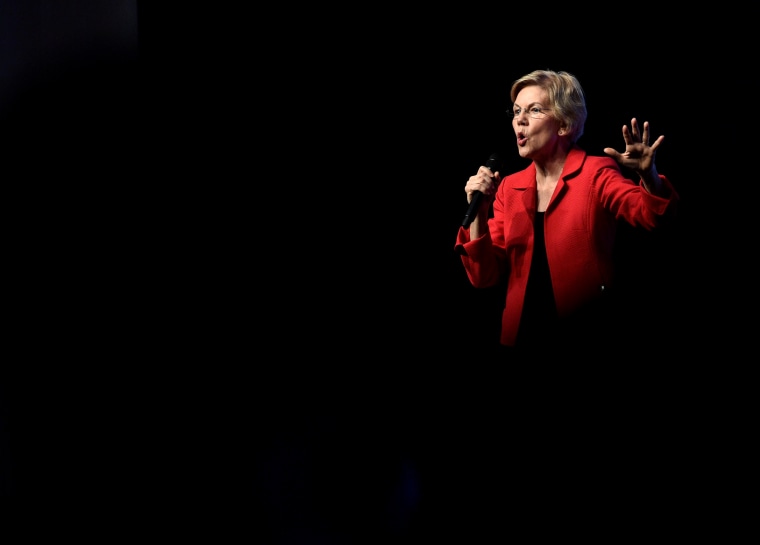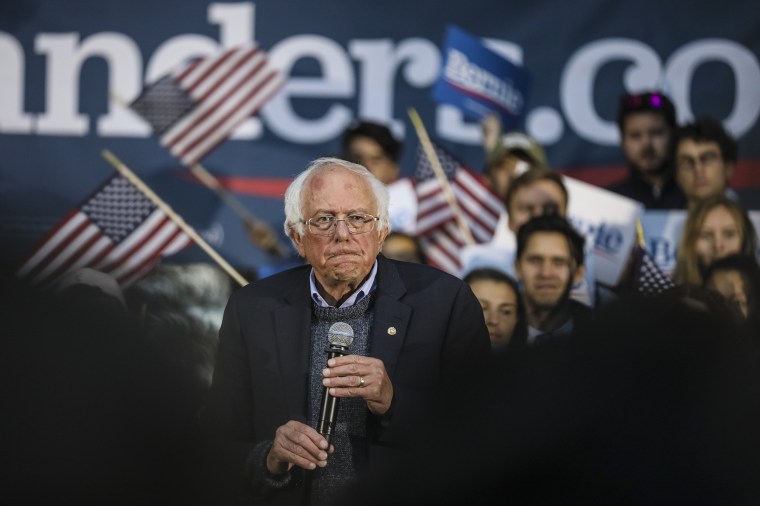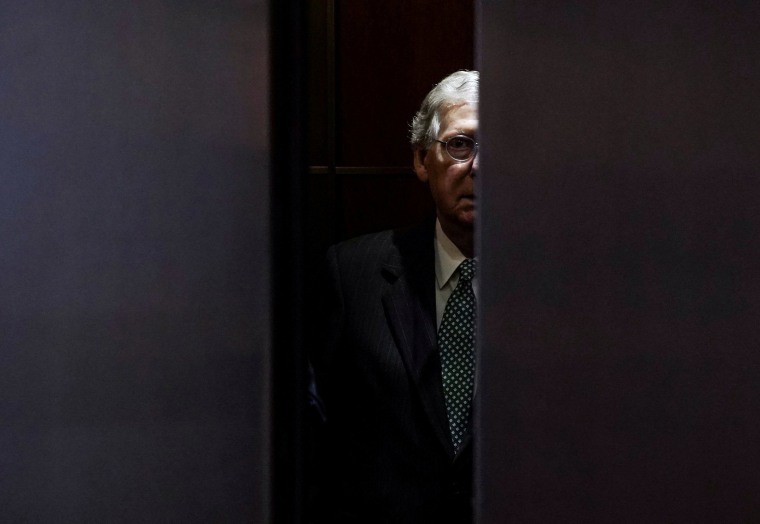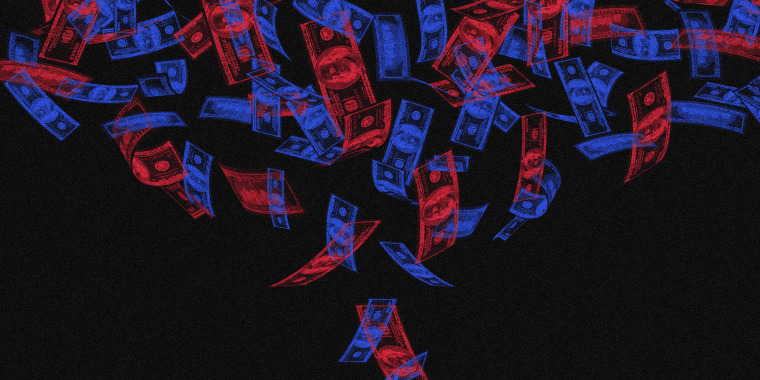WASHINGTON — For years, the progressive wing of the Democratic Party has railed against anonymous campaign contributions from billionaires and corporations. Despite the rhetoric, as 2020 nears, Democrats may be on track to beat the Republicans at the "dark money" game for the second national election in a row — and Republicans are nervous.
"Dark money" typically refers to funds raised by an organization set up as a social welfare organization under section 501(c)(4) of the tax code. The group can raise money to influence elections but is not required to disclose who gave the money. Candidates are not permitted to have any relationship with the group and may not coordinate advertising or spending.
Karl Rove, a top adviser to former President George W. Bush, and operatives connected to Senate Majority Leader Mitch McConnell, R-Ky., were among the Republican leaders who made the GOP's dark money operation powerful earlier in the decade. During the 2016 presidential election, conservative dark money groups outspent liberal groups nearly by 4-to-1 — $143 million to $37.8 million — according to one estimate.
Then, in the 2018 midterms, Democratic-aligned groups outspent Republican groups for the first time, spending more than $80 million, compared to $42.4 million for GOP groups, according to an Issue One analysis of data compiled by the Center for Responsive Politics. (The Center for Responsive Politics tracks money in politics, while Issue One is an advocacy group that seeks to reduce the influence of money in politics.)
While it is early in the 2020 election cycle, preliminary advertisement tracking reports from both sides indicate that Democratic dark money groups are slightly ahead, having spent at least $8.3 million, compared to at least $7.8 million by Republican groups. A GOP source familiar with 2020 fundraising also said most of the GOP dark money spending so far has been to issue ads that don't name a candidate.
The trend leaves some on the GOP side nervous — especially because some traditional Republican allies may not be using their full firepower in 2020.
Koch Industries, a GOP funding powerhouse, has indicated that it is open to supporting Democratic candidates in 2020.
The U.S. Chamber of Commerce spent $29 million in dark money in 2016, according to the good government advocacy group OpenSecrets, all of it on conservative candidates and causes. It has been trying to expand its base by reaching out to freshman Democrats, saying it backs "whoever wants to work with us" on free trade.
Republican fundraisers also worry that lawsuits and infighting have blunted the dependable financial power of the National Rifle Association.
"There is serious consternation about the lack of spending by groups that have traditionally come in heavy for GOP causes and campaigns," said a GOP source involved in 2020 fundraising.
Democrats, meanwhile, may be ahead in the early returns from the dark money race, but leaning on anonymous contributions from well-heeled backers is at odds with the public statements and actions of virtually every major Democratic 2020 contender.
Sens. Elizabeth Warren, D-Mass., Michael Bennet, D-Colo., Amy Klobuchar, D-Minn., Cory Booker, D-N.J., and Bernie Sanders, I-Vt., all sponsored a Senate bill that would force dark money groups to disclose donors. Former Vice President Joe Biden has proposed a campaign finance reform plan that would include ending dark money groups altogether.
"One of the hard things about dark money groups is they are independent," said Anna Massoglia, a dark money researcher at OpenSecrets. "Even if candidates decry dark money, they can't stop that group from supporting them."

But either way, it's expected that the Democratic nominee will be supported by the 501(c)(4) group Priorities USA, which raised $17 million in 2016. Priorities USA partners with the largest Democratic super PAC, Priorities USA Action, which raised $200 million for Hillary Clinton in 2016.
"We invented this model, and now everyone is doing it," said a veteran Republican strategist who did not want to be named.
Dark money groups are already backing some members of the Democratic field. There's even a "dark money" group that supports Sanders called Our Revolution that started after the 2016 election. The group raised $2.6 million last year largely in small donations.
"The idea was to try and capture some of the energy and to continue advocating for a political revolution," said Our Revolution spokesperson Paco Fabian.
Unlike other dark money groups, Our Revolution publishes a list of donors who give more than $250, but it does not say how much each donor gave. The identities of two donors who gave close to $200,000 each, for example, are unknown.
"There are some funders who wish to remain anonymous," Fabian said. "The reasons are, if you ask me, is they don't want people to hit them up for money."
Fabian said that despite his group's support for legislation that would force donor disclosure, it found that starting a 501(c)(4) organization was the "best vehicle" to support local groups. The organization does not run ads supporting Sanders, but it did endorse him earlier this year. Fabian said the group's events and phone banking often focus on issues that Sanders talks about, such as "Medicare for All" and the Green New Deal.
The Sanders campaign did not immediately respond to a request for comment.

Warren disavowed a dark money group that had been supporting her campaign in Iowa, according to Politico. The group, Women.Vote, started by a Warren donor in California, bought an ad in The Des Moines Register in November. A campaign spokesperson told NBC News that the campaign was not aware of the purchase and that it asked those involved to immediately stop buying ads of any kind.
The spokesperson said: "Elizabeth Warren believes democracy is undermined by anonymous, dark money attempts to influence voters — whether that influence is meant to help or hurt her candidacy."
2020 spending to date
So far, dark money spending for 2020 has been dominated by the Democrats' House fundraiser, House Majority Forward, which has already spent $1 million, according to the Center for Responsive Politics. An ad-tracking report from a GOP source involved in 2020 fundraising put pro-Democratic dark money spending on Senate races in Maine, Iowa, Arizona and Colorado even higher: at $5.4 million. That's on top of at least $750,000 in spending by Majority Forward, the slightly older Senate-focused twin of House Majority Forward.
Rachel Irwin, a spokesperson for the Senate version of Majority Forward, declined to comment on why a dark money group was better than a super PAC, which would require donor disclosure. She said the group's 2018 tax filing wouldn't be available until the spring.
A recent Facebook ad funded by the group cost $10,000 to $15,000 and appears to try to shore up support for Gary Peters of Michigan, who is listed as one of the most vulnerable Democrats in the Senate.
Majority Forward spent about $46 million on ads to support Democratic Senate candidates in 2018.
For the 2020 cycle, according to a document obtained by OpenSecrets, the House version of Majority Forward plans to raise $10 million for House candidates. That would counter what the GOP has been doing for its House candidates through the American Action Network.
Tax filings from 2018 show that even bigger mystery Democrats could be in the mix for 2020. One unnamed donor gave more than $50 million to the progressive Sixteen Thirty Fund to support its 2018 efforts. The existence of the donor was first reported by Politico. Sixteen Thirty wouldn't respond to requests for the donor's identity. That one donation is more than twice what tax filings show Rove's dark money group, Crossroads GPS, raised in 2016, its last active campaign cycle.
Executive Director Amy Kurtz sought to distinguish Sixteen Thirty from other dark money groups because it supports grassroots organizing and not candidates.
"Sixteen Thirty Fund is different than Our Revolution or any super PAC in that it is a 501(c)(4) that provides administrative services for nonprofit organizations and projects," Kurtz said. Among its grants last year was one for $8 million to the left-leaning League of Conservation Voters.
Advocacy groups that try to reduce the influence of money in politics have long been critical of dark money.
Brendan Fischer, director of federal reform at the Campaign Legal Center, said his group opposes dark money because "voters can't know which wealthy special interests are trying to influence their vote."
"And after the election — the public can't know if the officeholder is giving the donor something in return," Fischer said.
During her 2016 campaign, Clinton benefited from both dark money and super PAC support, "all while arguing that she would reform the system if elected to the White House," said Mike Beckel of Issue One.
But that didn't happen.
And efforts by Democrats to reform the system through legislation that would force dark money groups to disclose donors over $10,000 have been stopped in the Senate by McConnell, who has been closely tied to GOP dark money operations.

Irwin of Majority Forward said her dark money group continues to "play by the rules" of the current system, but she blamed the GOP for the lack of reform.
"There is only one party blocking progress on campaign finance reform," Irwin said, "and that's Mitch McConnell and Senate Republicans."
The success of one pro-McConnell dark money operation, the Kentucky Opportunity Coalition, was used as a template for the national dark money group One Nation, which supports Republican Senate candidates. The group is run by McConnell's former chief of staff Steven Law, who also used to be involved with Rove's Crossroads GPS. The Virginia-based group includes President Donald Trump's independent ethics lawyer, Bobby Burchfield.
The pro-Trump dark money group America First Policies raised $15 million last year, according to tax filings. A spokesperson told CNBC this year that during the first half of 2019, the 501(c)(4) and its associated super PAC America First Action together raised $17.8 million.
Unlike Democrats, Republicans tend not to disparage dark money.
"Democrats are utilizing dark money groups in multiple Senate races, and it reeks of hypocrisy given the message their candidates are running on the campaign trail," said Jesse Hunt, communications director for the National Republican Senatorial Committee. "They are talking out of both sides of their mouth."
